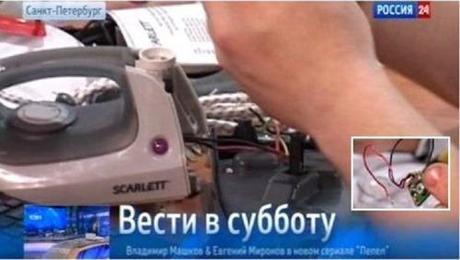 Russian TV footage shows a technician opening up an iron imported from China to find a “spy chip” with “a little microphone”.
Russian TV footage shows a technician opening up an iron imported from China to find a “spy chip” with “a little microphone”.
Kim Komando is the host of the Kim Komando Show, on computers, the Internet, and consumer electronics, which is broadcast and syndicated on over 150 radio stations in the U.S.
In other words, she knows her stuff.
__________________________
The following is from the Kim Komando blog of Jan. 26, 2014:
Back in September, I wrote a tip that claimed your household appliances would soon spy on you. You can read it here if you didn’t catch it the first time around.
The basic idea was that hackers will eventually break into high-tech TVs, light bulbs, nanny cams, refrigerators, toilets, smart thermostats and other appliances to learn more about you.
Well, “soon” is sooner than I thought – if we can believe a security report from a company called Proofpoint about a groundbreaking consumer-electronics botnet it discovered.
A refresher: A traditional botnet is a large collection of infected computers sending email spam or attacking other systems. Click here to learn how the Pony Botnet Controller stole millions of Facebook and Google passwords.
The botnet that Proofpoint supposedly found included more than 100,000 smart TVs, routers and at least one smart refrigerator. It allegedly sent out 750,000 spam emails.
While some questions have been raised about the accuracy of Proofpoint’s report, no one denies that a botnet like this is possible. With embedded computers invading common household appliances to make them smart, it was only a matter of time before this kind of thing started happening.
It doesn’t help that most Internet-connected gadgets don’t have the same security measures or third-party security programs available as computers or mobile gadgets. That means you have to trust that the manufacturer made the gadget impossible for hackers to crack.
As we’ve already seen from security flaws in smart light bulbs, smart toilets and routers, manufacturers can’t protect against crafty hackers. Even smart cars are vulnerable to digital carjacking.
Hackers will always find a way in, and there isn’t much you can do until the manufacturer releases a fix – assuming the gadget can even be upgraded with new software.
Where does this leave smart gadgets? Well, they aren’t going away, that’s for sure.
In fact, Google just bought Nest, which is known for its smart thermostats. I’m betting Google is trying to get in on the ground floor of the emerging “smart house” craze. So expect to see more about that in the coming year.
So, just like computers, smartphones and tablets keep improving their security over time to counter hackers, smart appliances will have to do the same. It would just be nice for once if manufacturers could be proactive about security instead of waiting for hackers to make the first move.
__________________________
H/t FOTM’s CSM
As CSM quipped in her email to me, I prefer my appliances to be “stupid”. LOL
See also “Made-in-China home appliances contain spy chips“.
~Eowyn

